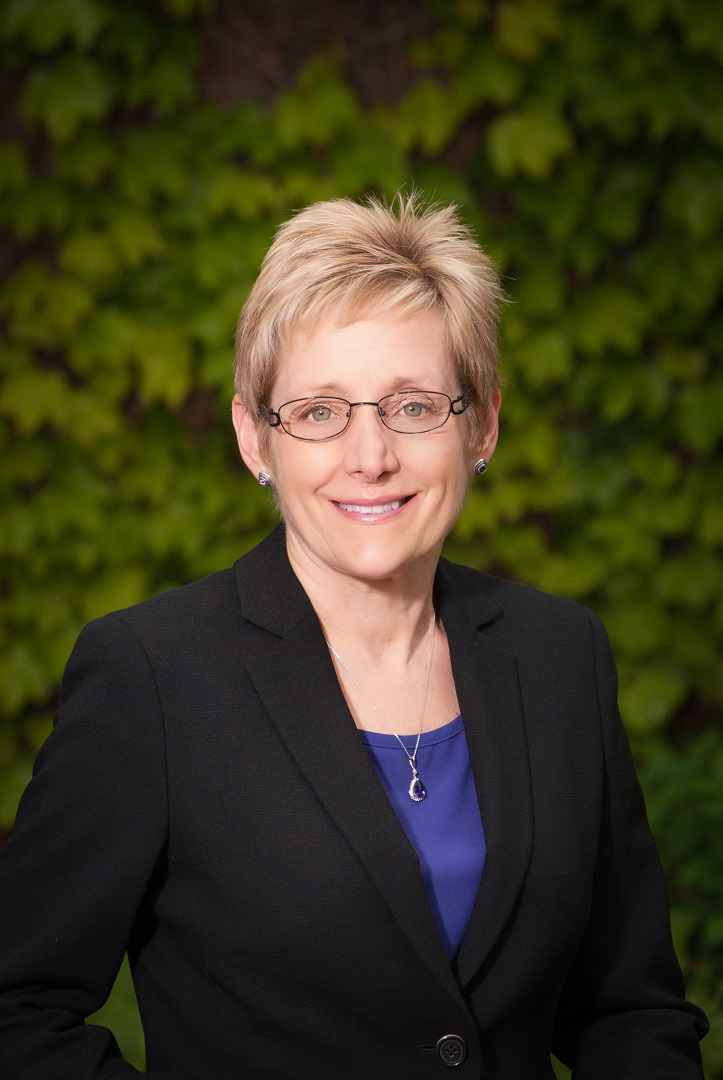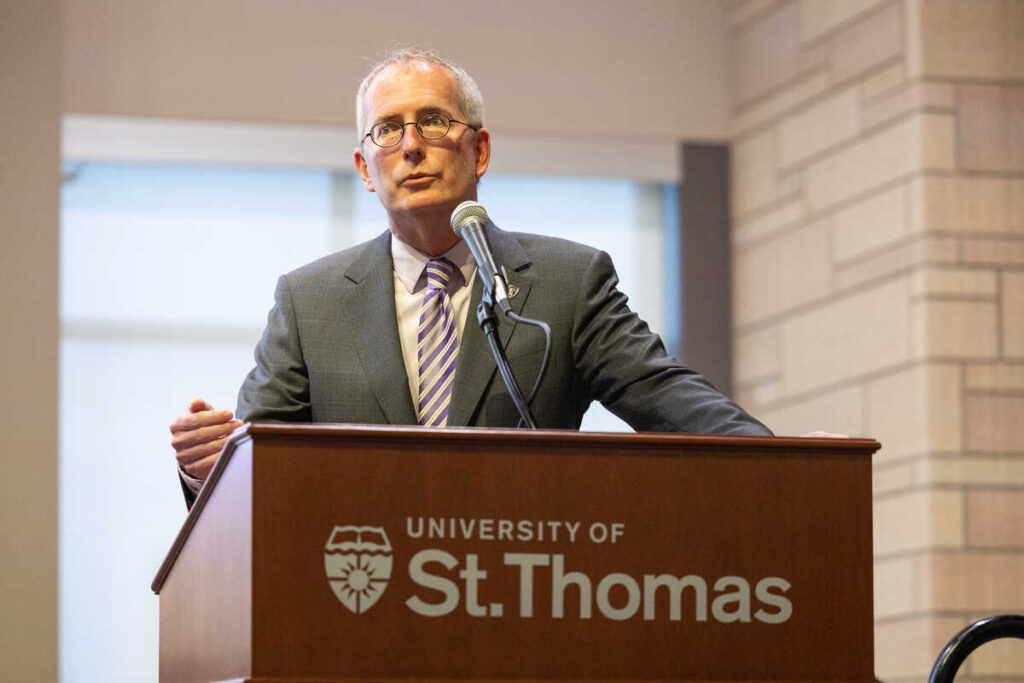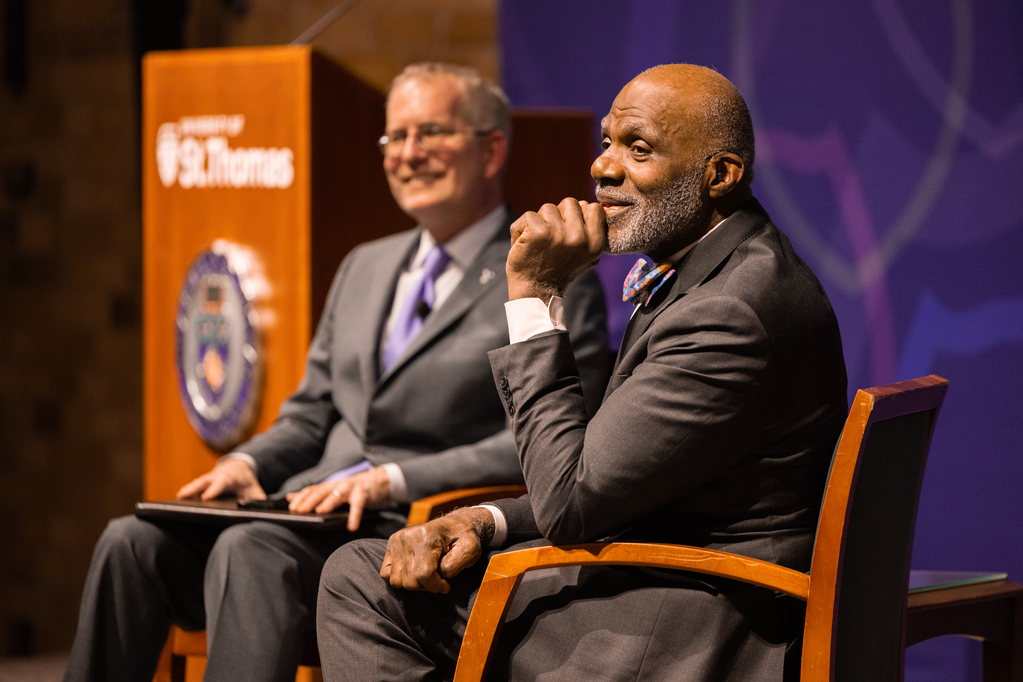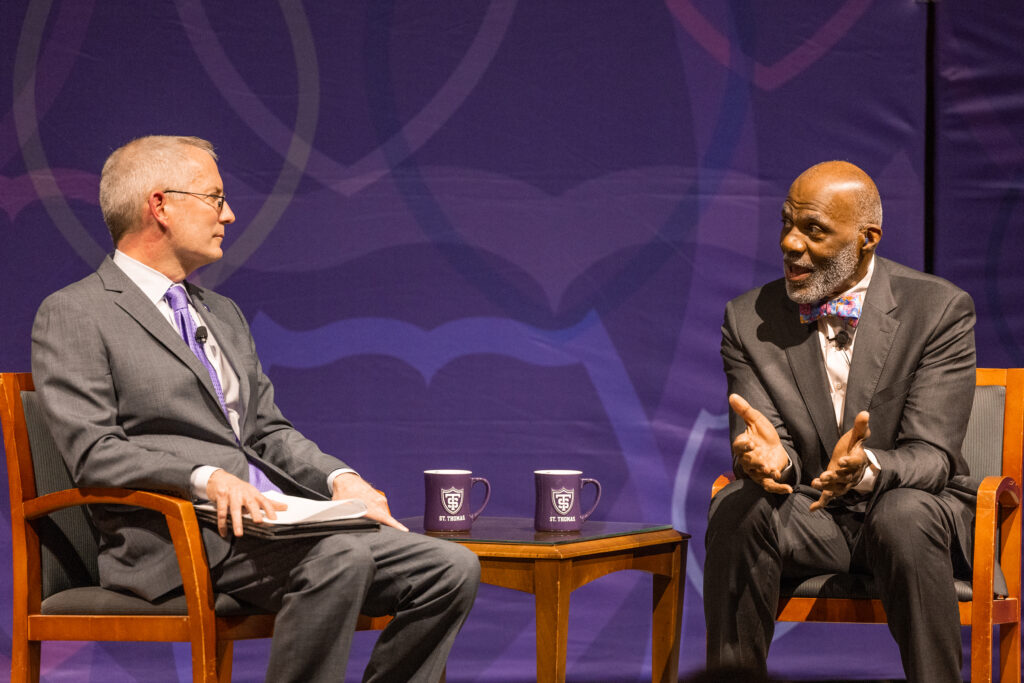Dr. Julie Sullivan, executive vice president and provost of the University of San Diego, will become the first woman and the first lay person to serve as president of the University of St. Thomas in its 128-year history.
The St. Thomas Board of Trustees today unanimously elected Sullivan, 55, to succeed Father Dennis Dease, who will retire June 30 after 22 years as 14th president of Minnesota’s largest private college or university.
A 13-member search committee of trustees and faculty and staff members unanimously recommended Sullivan to the board, which elected her during its winter meeting on the St. Paul campus. Sullivan met on several occasions with the search committee and also met privately earlier this month with more than 40 trustees, faculty members, administrators and students.
“I am thrilled and honored to be chosen,” said Sullivan, a Florida native who has taught or served in administrative positions in Oklahoma, North Carolina and California. “St. Thomas is an outstanding university which enjoys a wonderful history and legacy that is firmly rooted in its commitment to Catholic values and the liberal arts while looking forward with an entrepreneurial spirit. It is poised to do even more – to expand its influence and its visibility.”
Archbishop Emeritus Harry Flynn, chairman of the St. Thomas board since 1995, said Sullivan will bring excellent credentials to St. Thomas and will carry on a strong tradition nurtured by Dease.
“Our mission statement says that we seek to educate students ‘to be morally responsible leaders who think critically, act wisely and work skillfully to advance the common good,’ ” Flynn said. “I see those qualities and that commitment in Julie Sullivan. She will be an outstanding president.”
Flynn added that Sullivan has provided exceptional service to San Diego, “a Catholic university that has a great reputation and is highly respected in the local church.”
John M. Morrison, a trustee who served as chair of the search committee, said Sullivan’s extensive background as a professor and administrator has prepared her well for the St. Thomas presidency.
“Julie is tailor-made for the position,” said Morrison, who has served on the St. Thomas board since 1996. “She has the academic experience, business acumen and personal qualities we need in our next president, and her Roman Catholic faith is central to her life. St. Thomas, which is similar in many respects to that of the University of San Diego, will thrive under her leadership.”
Dease also applauded the choice of Sullivan and promised a smooth transition over the next several months. He will become president-emeritus following his retirement and will work with Sullivan and the board on special projects.
“Julie is a star,” Dease said. “Her spirit, authenticity and mission-driven leadership will be a great fit here, and her experience uniquely positions her to work with this community to make St. Thomas an even stronger university in the years ahead. I look forward to working with her.”
The Most Rev. John C. Nienstedt, archbishop of St. Paul and Minneapolis, praised the appointment.
“Dr. Sullivan brings with her a wealth of experience as a professor and administrator,” he said. “I have promised to work with her to advance the mission of the university as well as to find ways for us to collaborate in the programs of the archdiocese.”
Two Firsts for St. Thomas
Sullivan knows she will be observed closely as the first woman and the first lay person to serve as president of St. Thomas, which has been led by Roman Catholic priests since founder Archbishop John Ireland appointed Father Thomas O’Gorman in 1885. The St. Thomas board changed its bylaws two years ago to allow a Catholic lay person to serve as president in order to expand the pool of eligible candidates and hire the strongest person for the position.

Tommie high-fives Sullivan as she enters the Hearth Room for a press conference announcing her presidency. (Photo by Mike Ekern '02)
“The first order of business will be to acknowledge that, yes, a lay Catholic woman is your leader,” she said, “and I also want to assure the entire community that we will not deviate in our commitment to the Catholic intellectual tradition and Catholic values that have been a St. Thomas hallmark.
“That tradition and those values are so rich here – the call to pursue truth through the integration of faith and reason, with a strong commitment to the liberal arts. That tradition and those values are critical, particularly in helping young people understand the complexity and the interconnectedness of our world and their places in it.
“I have the deepest respect for the Catholic Church as a vibrant and living institution. A Catholic university is a special place where we engage with the Church in a spirit of free inquiry and robust diaologue, and scholars here at St. Thomas will always play a vital role in that regard.”
Sullivan cited similarities between St. Thomas and San Diego, where she has served as the No. 2 administrator since 2005, when it comes to the emphasis placed by both institutions on practicing the principles of Catholic social teaching.
“It’s in San Diego’s DNA because of what we do – and it’s in your DNA, too,” she said. “When I was reading your faculty bios, every one of them included something about what they do in service to the community. Students also have a real commitment to being out in the world, to helping to solve problems, and in valuing the dignity of every human being.
“We are all children of God, and I see a lot of evidence of this conviction in the St. Thomas community. I sense that passion and that care for others.”
Premed to Business
Sullivan was born in 1957 in Gainesville, Fla., and grew up with a younger brother in Jacksonville and Live Oak, Fla. Her father owned an automobile dealership and her mother was a homemaker and volunteer.
She enrolled at Valdosta State College in Georgia after her junior year in high school and transferred a year later to the University of Florida in Gainesville. She began her studies as a premed major and enjoyed and excelled in numerous science classes, but changed her mind after organic chemistry, where “it just didn’t click for me.”
Sullivan thought about majors in actuarial science or pharmacy before she settled on accounting, and she still remembers her father’s words: “I don’t care what your major is in; you just better have a job when you finish.”
She planned to work as a public accountant, and after a six-month internship with what then was Ernst and Whinney, she concluded that she preferred tax accounting over auditing. She needed a master’s degree to work directly in tax accounting, so she continued her studies at Florida.
“I had a teaching assistantship during my master’s program and discovered I loved to teach,” she said. “Thus, I decided to remain at Florida and pursue a Ph.D. in business administration.”
Sullivan began her academic career in 1983 at the University of Oklahoma, and four years later moved to the University of North Carolina, Chapel Hill, to be a visiting professor for one year. She was hired as a tenure-track faculty member at the end of that year.
During her 16 years at North Carolina, Sullivan became an Ernst and Young Distinguished Professor and served as co-director of the Center for Innovation and Learning, director of the Center for International Business Education and Research, associate dean of the master’s of accounting program and senior associate dean of the Kenan-Flagler Business School.
A Move to the West Coast
She was interim dean of Kenan-Flagler in 2003, leading a $180 million capital campaign, when she moved to California and became a full professor in the Rady School of Management at the University of California-San Diego.
One night at a dinner party, Sullivan met Dr. Mary Lyons, president of the University of San Diego (and former president of the College of St. Benedict in St. Joseph, Minn.). They later met at another party at Lyons’ home, and Lyons mentioned that she was recruiting for her provost position.
“I wished her the very best in her search,” Sullivan said. “Her comment continued to resurface in my mind for several weeks, until I phoned the search consultant to learn more about the job. After an hour of discussion, I was convinced the University of San Diego could be a good opportunity for me.”
Lyons felt the same way. She hired Sullivan as executive vice president and provost in 2005. Today, Sullivan is responsible for all degree and nondegree educational programs, information technology services, admissions, financial aid and career services. She also oversees the chief financial officer and has responsibility for the operating budget.
San Diego is a private Catholic university, founded in 1949 by Bishop Charles Buddy of the Diocese of San Diego as the College for Men and School of Law and by the Society of the Sacred Heart as the College for Women. The colleges merged in 1972 to create the University of San Diego, which today enrolls 7,800 students.
Sullivan admitted to “a learning curve” when she arrived at San Diego, but she found herself stimulated by a broader sphere of people with whom she could interact in a new environment – that of a Catholic institution.
“I had not worked in a faith-based institution,” she said. “You have to experience it to fully appreciate the richness of it, and having done so, I can’t imagine going back to a non-Catholic institution. A Catholic university explicitly adds such an important dimension into the mission, identity and educational process for our students.”
She also found less bureaucracy than at public institutions, allowing her to make changes such as hiring 175 new tenure and tenure-track faculty, doubling the size of the faculty research grants program, launching the Shiley-Macos School of Engineering, and establishing an International Center, the Joan B. Kroc School of Peace Studies and the Center for Catholic Thought and Culture.
Other accomplishments during her eight-year tenure include: increasing the freshman academic profile (25 to 27 ACT and 3.7 to 3.9 GPA), achieving a No. 1 national ranking among doctoral institutions for the percentage of students who study abroad, increasing the freshman-to-sophomore retention rate from 85 percent to 90 percent, increasing minority student enrollment from 25 percent to 32 percent, and installing the nation’s eighth-largest college solar energy facility.
One achievement of which she is particularly proud is the 2011 designation of San Diego as a “Changemaker Campus” by Ashoka, an Arlington, Va.-based organization that supports successful social entrepreneurs around the globe. Last September, in an academic convocation address, “University in Society and the Relevancy of the USD Changemaker Campus,” Sullivan said San Diego’s heritage in living out the principles of Catholic social thought had helped define the university as a “changemaker” campus.
“A USD education,” she said, “inspires and empowers students to become changemakers – to make the difference they seek – to become individuals with self-fulfilling lives who are proactively creating positive social, environmental and economic value.”
Sullivan believes St. Thomas, too, can become a “changemaker” campus – if not by designation by Ashoka, then certainly by day-to-day practice.
“I think all the ingredients are there,” she said. “It’s a matter of identifying them, connecting them, leveraging them, and making a commitment to sustain and expand them.”
Challenges Always Will Abound
Sullivan sees the same kinds of challenges at St. Thomas that are at San Diego – and most other private colleges and universities. They are tuition-driven, with a need to make their educations more accessible and more affordable.
“I also think there are similar value drivers in the sense of what you are getting from your education,” she said. “I see at St. Thomas what I have seen at San Diego – when we ask our alumni to reflect on the most valuable things in our education, they always mention their relationships to faculty, who not only taught them well but mentored them as individuals.
“Our kind of education is never going to be cheap – not at the quality we want to deliver. We always will need to make our education as affordable as possible while increasing access. We will need to diversify our revenue streams while being conscious of our mission.”
About her Family
Sullivan and her husband, Robert, have four children. Two are in California: Dr. William Collins, a physician, and his wife are in their third years of residency at UC-San Diego, and Caitlin Collins works in a health and technology start-up in San Francisco. They also have two children from Ethiopia: Tadesse Sullivan lives in Charlotte, N.C., and Almaz Sullivan lives in Belgium with her husband and their two adopted Ethiopian daughters.
Robert Sullivan is founding dean of the Rady School of Management at the University of California-San Diego.
The Sullivans enjoy family, exercise, travel, a good bottle of red wine and their two puppies, Downey and Oliver.






